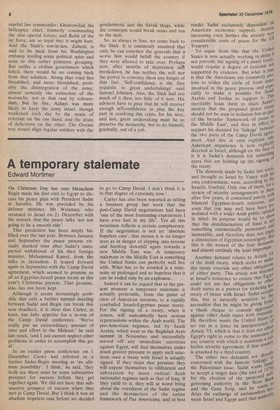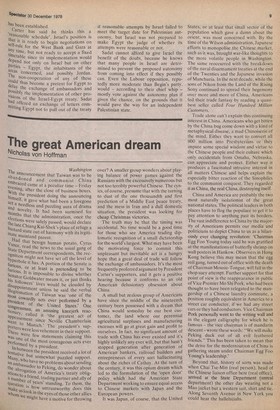A temporary stalemate
Edward Mortimer
On Christmas Day last year Menachem Begin made his first visit to Egypt to discuss his peace plan with President Sadat at Ismailia. He was preceded by his defence minister, Mr Weizman, who returned to Israel on 21 December with the remark that the peace talks 'are not going to be a smooth ride'.
That prediction has been amply fulfilled over the last year. Between January and September the peace process virtually marked time after Sadat's unexpected withdrawal of his then foreign minister, Muhammad Kamel, from the talks in Jerusalem. It leaped forward again in September with the Camp David agreement, which seemed to promise us all an Egyptian-Israeli peace treaty as this year's Christmas present. That promise, alas, has not been kept.
Although it seems increasingly probable that only a further summit meeting between Sadat and Begin can break this new deadlock, it is clear that Carter, at least, has little appetite for a re-run of the Camp David conference. 'We've really put an extraordinary amount of time and effort in the Mideast,' he said last week, 'and I just cannot neglect other problems in order to accomplish this goal.'
In an earlier press conference on 1 December Carter had referred to a further Sadat-Begin meeting as 'an ultimate possibility'. 'I think,' he said, 'they both see there must be some substantive prospect for success ,before they get together again. We did not have that substantive prospect of success when they met at Camp David. But I think it was an absolute hopeless case before we decided to go to Camp David. I don't think it is in that degree of extremity now.'
• Carter has also been reported as telling a business group last week that the post-Camp David negotiations had been 'one of the most frustrating experiences I have ever had in my life'. Yet all this weariness reflects a certain complacency. If the -negotiation is not an 'absolute hopeless case', that means it is no longer seen as in danger of slipping into reverse and hurtling downhill again towards a new Middle East war. A temporary stalemate in the Middle East is something the United States can perfectly well live with. What has to be avoided is a stalemate so prolonged and so hopeless that it can be ended only by an explosion.
Indeed it can be argued that at the present moment a temporary stalemate is actually preferable, from the point of view of American interests, to a rapidly concluded Israeli-Egyptian peace treaty. For the signing of a treaty, when it comes, will undoubtedly have serious repercussions within the Arab world. The pro-American regimes, led by Saudi Arabia, which went to the Baghdad Arab summit in November and successfully staved off any immediate sanctions against Egypt, will find themselves under much greater pressure to apply such sanctions once a treaty with Israel is actually signed. If they resist that pressure they will expose themselves to vilification and subversion by more radical Arab nationalist regimes such as that of Iraq. If they yield to it, they will at worst bring about the overthrow of the Sadat regime and the destruction of the entire framework of Pax Americana, and at best Spectator 30 December 1978 render Sadat exclusively dependent °n American economic support, therebY increasing even further the already considerable costs of peace for the Treasury. To argue from this that the Unite;c1$ States is now actually working to delay' not prevent, the signing of a peace treatY, would require a degree of cynicism IlOt supported by evidence. But what is true is that the Americans are extremely an ious to widen the circle of Arab states involved in the peace process, and esPe; cially to make it possible for Sant" Arabia and Jordan to support it. This inevitably leads them to share Sadaes anxiety that the proposed peace treat, should not be seen in isolation but as Part of the broader 'framework of peace ja the Middle East', and thus in effect t° support his demand for 'linkage' bet'." the two parts of the Camp David agree" meat. And this in turn explains w.thY American impatience is now explicil directed at Israel, although on the face ° it it is Sadat's demands for somethil extra that are holding up the signing ° the treaty. The demands made by Sadat last' eeic.' and brought to Israel by Vance with own endorsement, were, according to Israelis, fourfold. Only one of then'', fe,r:t review of security arrangements in Sin.th" after five years, is concerned purely d bilateral Egyptian-Israeli relations, and bilateral that one may well have been fert; mulated with a wider Arab public 001:.i% in mind: its purpose would be to s",c:01 that the demilitarisation of Sinai ts d something automatically permanent Iv immutable, and therefore does not i't a diminution of Egyptian sovereignty. Ocis this is the newest of the four derclan and almost certinaly the least important Another demand relates to Artic'e of the draft treaty, which seeks to inar—s this treaty override any other obligatielid of either party. This article was insole t at Israel's insistence to ensure that EgYePt. could not use her obligations to 0t,11,1. Arab states as a pretext for treaty of peace with Israel. Sadat nece Pie violating o'is treaty of peace with Israel. Sadat nece Pie this, but is naturally sensitive to the accusation that he might be giving Is'? ft a blank cheque to commit aggress!°„, against other Arab states with imntall'ic; He therefore wants the United States of set out in a letter its interpretation et Article VI, which is that it does not affe„f Egypt's right to come to the assistance any country with which it maintains a et°rry lective security agreement, if that cot° is attacked by a third country. ; The other two demands are air, to concerned with the famous'linkage 41 the Palestinian issue. Sadat wants Isl.to accept a target date (the end of 19119/. for the election of the proposed se ,, governing authority in the West BantO and the Gaza Strip, and he wants,,,,e delay the exchange of ambassadors u'i..ty ween Israel and Egypt until that antbc" has been established. Carter has said he thinks this a reasonable schedule'. Israel's position is that it is ready to begin negotiations on self-rule for the West Bank and Gaza at any time, but not ready to accept a fixed timetable since its implementation would depend not only on Israel but on other parties — Egypt, the inhabitants of the areas concerned, and possibly Jordan. The non-cooperation of any of these could thus become a pretext for Egypt to delay the exchange of ambassadors and Possibly the implementation of other provisions of the Israel-Egypt treaty. Sadat had offered an exchange of letters committing Egypt not to pull out of the treaty it reasonable attempts by Israel failed to meet the target date for Palestinian autonomy, but Israel was not prepared to make Egypt the judge of whether its attempts were reasonable or not.
Sadat cannot afford to give Israel the benefit of the doubt, because he knows that many people in Israel are determined to prevent the proposed autonomy from coming into effect if they possibly can. Even the Labour opposition, reputedly more moderate than Begin's party, would — according to their chief whip — mostly vote against the autonomy plan if given the chance, on the grounds that it would pave the way for an independent Palestinian state.























































 Previous page
Previous page